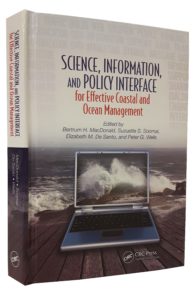“The Science-Policy Interface in Coastal and Ocean Management” is a series of posts highlighting the chapters in the new book: Science, Information, and Policy Interface for Effective Coastal and Ocean Management, edited by Bertrum H. MacDonald, Suzuette S. Soomai, Elizabeth M. De Santo, and Peter G. Wells, published by CRC Press (Taylor & Francis).
Several important factors provide cause for optimism that the science-policy interface at the global governance level should be strong. Possibly the most important factor is simply buy-in. At the global level, countries have explicitly acknowledged the need for a sound science foundation for ocean policy, at least since the World Summit on Sustainable Development (WSSD) Plan of Action, and the very recent work on the next generation of Sustainable Development Goals (SDGs) reinforced that commitment. A second factor is that not only does nearly every intergovernmental organization (IGO) with a marine mandate have some form of science advisory process, but even a global science-policy assessment – the UN Regular Process – has been established and supported. A third fact is that essentially all of those IGOs have embraced an ecosystem approach, acknowledging not just the need for some sort of science input to policy, but a need for broad-based science input, taking the ecosystem and its dynamics into account in the foundations for policy.
Unfortunately, countering factors have made progress on this front frustratingly slow in many cases. Ocean governance and management are sectoral. This situation not only contributes to fragmentation of policy-making but it also means that the many intergovernmental institutions, each with a mandate for policy and management of a particular sector, require science support for their individual policies and programs, and each has its own body to provide such support. These sectoral processes often prefer different data streams, use different technical terms, give the most credence to different analytical methods, and manage risk from different perspectives.
A second feature posing challenges to an effective, integrated science-policy interface is that the more global an organisation is, the more likely it operates as a consensus body. Decision-making will not move faster than the most sceptical States or Parties participating in the meeting, which frequently tries the patience of science advisors and often puts undue focus on uncertainty, even when it is not large. The policy tension caused by scientific uncertainty is amplified because policy and management errors can either under-regulate and allow misses (policies that fail to effectively address issues where practice has to change if uses are to be sustainable) or result in false alarms (policies that are overly intrusive, restricting human activities beyond the degree needed to achieve sustainability). The costs of misses and false alarms are distributed very differently, with the costs of misses largely borne (in the short term) by the environment, and the cost of false alarms largely borne by economic and social interests. Many factors influence tolerance for the two types of errors, including sectoral culture, degree of economic development, and level of past degradation. Policy makers may receive very sound scientific information but still not be able to find an evidence-based consensus. Since Chapter 4 was written, the 2030 Sustainable Development Goals have been adopted, and implementation has commenced. All the concerns noted here will play out as plans for implementation proceed. Many edifying lessons may be learned if science and policy-makers engage constructively through the SDG process. Read Chapter 4 to obtain a more detailed understanding of this subject.
The individual book chapters are available from the publisher’s website: Chapter 4
The full book is available in print and e-book formats from the publisher at this link
Author: Jake Rice
